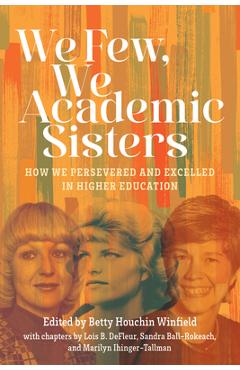We Few, We Academic Sisters: How We Persevered and Excelled in Higher Education - Lois B. Defleur

Detalii We Few, We Academic Sisters:
libris.ro
143.59 Lei
179.49 Lei
Biography & Autobiography
Lois B. Defleur
We Few, We Academic Sisters: - Disponibil la libris.ro
Pe YEO găsești We Few, We Academic Sisters: de la Lois B. Defleur, în categoria Biography & Autobiography.
Indiferent de nevoile tale, We Few, We Academic Sisters: How We Persevered and Excelled in Higher Education - Lois B. Defleur din categoria Biography & Autobiography îți poate aduce un echilibru perfect între calitate și preț, cu avantaje practice și moderne.
Caracteristici și Avantaje ale produsului We Few, We Academic Sisters:
- Departament: auto-moto-rca
- Ideal pentru iubitorii de mașini și motociclete.
- Conținutul acestui produs te ajută să întreții și să îmbunătățești performanțele vehiculului tău.
Preț: 143.59 Lei
Caracteristicile produsului We Few, We Academic Sisters:
- Brand: Lois B. Defleur
- Categoria: Biography & Autobiography
- Magazin: libris.ro
- Ultima actualizare: 25-10-2024 01:12:27
Comandă We Few, We Academic Sisters: Online, Simplu și Rapid
Prin intermediul platformei YEO, poți comanda We Few, We Academic Sisters: de la libris.ro rapid și în siguranță. Bucură-te de o experiență de cumpărături online optimizată și descoperă cele mai bune oferte actualizate constant.
Descriere magazin:
Starting in 1967, a time when fewer than 1% of women completed any education beyond four years of college, the Washington State University (WSU) Sociology Department dared to hire three female faculty members who became supportive lifelong friends: Lois B. DeFleur, Sandra Ball-Rokeach, and Marilyn Ihinger-Tallman. Each served as a role model and paved the way for those who followed. In chronologically based chapters, the three colleagues discuss their childhoods, educational and research efforts, personal lives, and career advancements. They note major influences, share what they learned, and acknowledge assistance they received along the way. Though all married professors, they fought to be known as individual scholars, overcoming quotas, nepotism rules, sexual discrimination and harassment, and intense societal pressure to follow traditional female roles. Each also faced significant personal challenges: balancing family life, divorce, cancer diagnoses, the illness of a partner. These trailblazers\' impressive careers parallel larger national events and the onset of increasing opportunities for women. Initially associate or assistant professors, all became full professors when it was exceedingly rare. Dr. DeFleur later held positions as dean, provost, and university president. Dr. Ball-Rokeach gained international status as a major media sociologist, and Dr. Ihinger-Tallman became WSU\'s first female chair of the Sociology Department. Their inspiring stories highlight the importance of community and offer meaningful guidance to current women academics.

Produse asemănătoare
Produse marca Lois B. Defleur

We Few, We Academic Sisters: How We Persevered and Excelled in Higher Education - Lois B. Defleur
![]() libris.ro
libris.ro
Actualizat in 25/10/2024
143.59 Lei